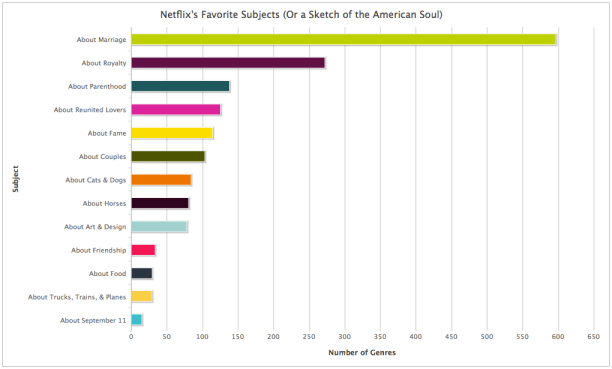Back from the holiday break, we look at data’s influence on culture; glass, both as a material for transmitting bits, and as a wearable interface; and the (im)permanence of data.
As always, if you want to keep up with what we’re reading/thinking about on a weekly basis, the best way is to subscribe to the “else” feed, either as an email newsletter or through RSS. And tweet us links!
How Netflix Reverse Engineered Hollywood — The Atlantic
Alexis Madrigal and Ian Bogost do a little datamining to uncover the grammar of Netflix: 76,897 combinations of overly specific genres to tailor to every taste. It’s a great story of data journalism, and of the emerging influence of data on our culture. And they even built a generator from the data, which offered me “Hitman Coming of Age Stories.” Read through for the Perry Mason puzzle at the end: “The more complexity you add to a machine world, you’re adding serendipity that you couldn’t imagine. Perry Mason is going to happen. These ghosts in the machine are always going to be a by-product of the complexity. And sometimes we call it a bug and sometimes we call it a feature.”

Data Broker Was Selling Lists Of Rape Victims, Alcoholics, and ‘Erectile Dysfunction Sufferers’ — Forbes
If you’re in the camp that says “what’s the worst that could happen if brokers are selling your data for advertising,” this list of vulnerable categorizations could change your mind.
The Postmodernity of Big Data — The New Inquiry
Getting a little heavy on the theory, but this is a nice start tying together big data, postmodernism and skepticism.
Kanye West Now Has His Own Cryptocurrency and It’s Called Coinye West — TIME
Amid the Bitcoin hype, new currencies like Coinye West and Dogecoin are cropping up, testing out the fundamentals of the cryptocurrency model.
The spread of glass — Benedict Evans
A concise and interesting metric about the spread of glass as the transit for our bits: “It’s all just glass with a data connection.”
I, Glasshole: My Year With Google Glass — Wired.com
Some interesting observations from a guy who wore Glass for an entire year – namely that he grew to really hate having to look at his smartphone. As for me, I’m compiling a list of all the places I consider briefly but decide not to wear Glass out.
One code to rule them all: How big data could help the 1 percent and hurt the little guy — Salon
This offers a nice discussion of the tension between algorithmic regulation (that is, putting regulation into programmable machines, such as Youtube DMCA takedowns) and the problem of regulating the algorithms themselves.
Do We Want an Erasable Internet? — WSJ.com
Do we assume the permanence of data, or not? This discusses the differences between a “forever internet” versus “erasable internet.”
Target confirms breach: 40 million accounts affected — ZDNet
This story got a lot of coverage over the holidays, but the most interesting thing here is that Target apparently stored CVV codes, which shows that if the data can be stored it will be stored, even if it’s not supposed to be.
Hyping Artificial Intelligence, Yet Again — The New Yorker
John Markoff’s front page discussion of deep learning seemed a little vague and hype-y to us, though we’ve been paying close attention to latest AI surge, too. The New Yorker offers a little historical context.
We need to talk about TED — Benjamin Bratton
Criticism of TED talks oversimplification of complex issues and memification of ideas isn’t new, but it has never taken the form of TED talk before… #meta.
Edward Snowden, Whistle-Blower — The New York Times
The New York Times editorial board came out in support of classifying Edward Snowden as a whistle-blower (as opposed to a traitor) and calls for clemency. We tend to agree.






